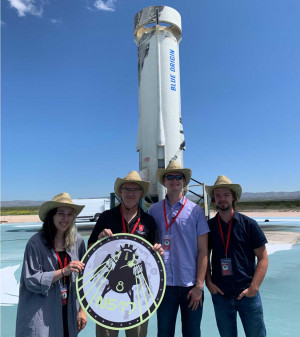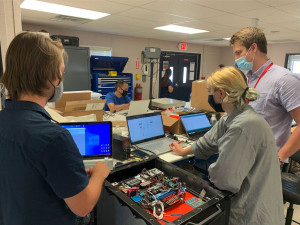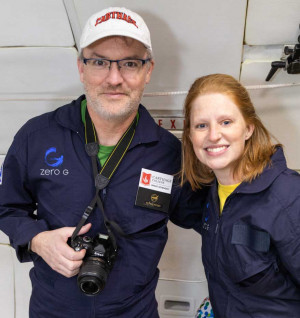
Prof. Kevin Crosby receives $650K NASA grant to develop new spaceflight technology
Professor Kevin Crosby,
His new grant-funded project will focus on sensing the location and distribution of fuel in spacecraft during flight and supports NASA’s larger goal of developing refueling capabilities for satellites and spacecraft. Several Carthage students will participate in the development and testing of the project, which will begin in June 2022.
Prof. Crosby’s grant proposal, “Noninvasive Detection of Liquid Propellant Location During Microgravity Transfer,” was one of nine TechFlight projects selected for funding under the Flight Opportunities program held within NASA’s Space Technology Mission Directorate.
The new technology will test the ability of sensors to accurately identify the location and distribution of the liquid surface during propellant transfer in microgravity, a capability that is necessary for engine restart of spacecraft and for propellant transfer between in-space fuel depots and visiting spacecraft.

“This project will give several students the unique opportunity to work on prominent research in an exciting field,” says Prof. Crosby. “As a result, they’ll end up in careers that they never would have imagined before coming to Carthage. If we solve some hard problems along the way, all the better.”
As part of the funding, Prof. Crosby will be able to purchase parabolic and suborbital flights to test his experiment and better prepare it for future NASA missions and use in the commercial space industry.

“I’m grateful to the Flight Opportunities Program at NASA for their continued support of my work,” says Prof. Crosby. “It’s very exciting to work at the edge of the unknown, and the opportunity to share that excitement with students is really the driver for all of this work.”
The new technology is anticipated to take flight on both Zero Gravity Corporation’s (ZERO-G) G-Force One parabolic aircraft and Blue Origin’s New Shepard in 2023 and 2024.
